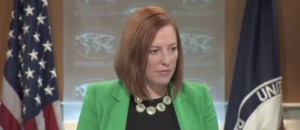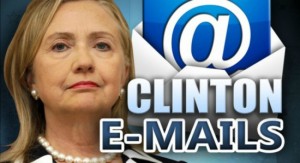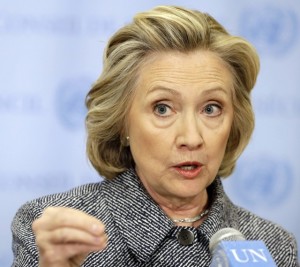Editor’s Note – The Author of the following article is an SUA ‘Kitchen Cabinet” founding member and he is a foreign policy and national security analyst and served in the departments of State and Defense.
He visited more than 50 U.S. overseas diplomatic posts on official missions.
After its release this morning, Jen Psaki, the State Department Spokesperson finally admitted that Hillary Clinton did not sign a OF-109 separation form after all:

Jen Psaki, State Department Spokesperson: State Department Has ‘No Record’ Of Clinton Signing Separation Statement
State Department spokeswoman Jen Psaki said Tuesday the agency is “fairly certain” that former Secretary of State Hillary Clinton did not sign a separation statement upon her departure from Foggy Bottom.
“We don’t have record of it,” Psaki admitted.
She was quick to point out that her two immediate predecessors had no signed form on record either, but that is trivial in comparison to the deep hot water Clinton should be in.
Please read on:
With Private Storage, Clinton May Have Exposed State Secrets To International Cyber Crime
By Fred Gedrich – Breitbart
ABC News recently reported that House Speaker John Boehner will soon be announcing a new congressional investigation into the dubious way former Secretary of State Hillary Clinton controlled her official State Department emails during the four years she served as the nation’s top diplomat and the two years since leaving office.
By storing the emails in an isolated server outside of State Department control in a private personal computer system, Mrs. Clinton and the State Department were able to avoid Freedom of Information Act requests from Congress and the media on sensitive topics such as Benghazi. Her actions may also have compromised national security.
Addressing the recording-keeping and record-custody issues does not address the potential national security implications of what the former Secretary did. After the President and Vice-President, the Secretary of State is the highest position in the executive branch of the U.S. Government.
The Secretary carries the President’s foreign policies and participates as a key member of the President’s National Security Council, providing advice and assistance to the President on the most important and urgent foreign policies and national security matters.
Therefore, the Secretary is an automatic target of those seeking to learn as much as possible about what is going on inside the highest levels of the U.S. Government through various forms of espionage activities.
In a hastily-arranged recent press conference at the United Nations to respond to a story published by the New York Times, the former Secretary of State discussed the unique way she stored her official government emails and presented the circumstances as more or less no big deal.
Former Justice Department officials Shannen Coffin and Dan Metcalfe and Federal prosecutor Andrew McCarthy, in articles appearing in National Review and Politico, disagreed with her.
In their essays on this subject, among other things, Coffin wondered whether the former Secretary falsely certified the return of all records upon her departure from the State Department; Metcalfe, a retired government FOIA expert, opined that the former Secretary’s email defense is laughable; and McCarthy argued that the former Secretary is still violating the law and the Justice Department should take custody of her server.
Being able to access any of the Secretary’s official or private communications– whether they are classified, sensitive or otherwise– would be an intelligence coup for U.S. foes and friends engaged in espionage, and could be used by them for such nefarious activities as waging economic, military and political sabotage and warfare against the United States, or mere blackmail.
And it is naïve for anyone to believe that U.S. adversaries like China, Russia and others – skilled in state-of-the-art electronic cyber-theft and eavesdropping and who can intrude into computer systems without detection – wouldn’t try to take advantage of a situation like this if they knew the Secretary of State’s emails were being stored in a private server.
The State Department’s Bureau of Diplomatic Security serves as a firewall in preventing U.S. enemies and others from gaining access to U.S. classified as sensitive information, whether it is the Secretary of State or anyone else employed by the State Department.
Among other things, DS security engineers monitor and negate electronic threats, while its intelligence and information security experts educate employees on counterintelligence and possible vulnerabilities that might be exploited by foreign intelligence agencies.
To mitigate these threats, DS continually develops, tests, and updates security standards as necessary for all State Department’s computer systems and requires everyone leaving the agency, under penalties of law, to turn over all government records when their appointments or employment expires (see U.S. Department of State Foreign Affairs Manual Volume 12 – Diplomatic Security Form OF-109, PDF).
One can easily understand why the State Department’s security folks are so concerned about espionage prevention. China’s cyber-spies on several notable occasions (e.g., Titan Rain and Mandiant) successfully breached the U.S.’s most sophisticated security-protected computer systems at U.S. government agencies, sensitive military bases, defense contractors, aerospace companies through internet email intrusion. For skilled cyber-spies, hacking into someone’s private computer system requires little effort.
The responses from the former Secretary and State Department spokesperson, Jen Psaki, on this subject to date have been far less than forthcoming, especially regarding the security aspect. As Congress looks further into this matter, it might want to consider asking key current and former officials within the Department’s Bureau of Diplomatic Security to formally testify before Congress and ask them the following questions:
- Did DS know and approve of the manner in which former Secretary Clinton, and her closest State Department colleagues Huma Abedin and Cheryl Mills, were storing their State Department-related emails in a private computer system outside of the State Department’s span of control? If the answer is yes, did DS evaluate and certify the former secretary’s personal computer system met State Department security standards?
- Did DS require the former secretary to sign the State Department’s Separation Agreement, OF 109, which requires by U.S. Foreign Affairs Manual Volume 12 – Diplomatic Security, in part, that former State Department persons like Mrs. Clinton, Miss Abedin, and Miss Mills to turn over all government-related records, including emails, at the conclusion of their appointments and/or employment? If the answer is yes, does DS have a copy of the signed documents? If the answer is no, did DS officials waive the requirement to do so for these individuals?
- Did DS give the former secretary permission to delete more than 30,000 emails from her personal computer system before DS or a neutral arbiter could examine them?
While this list of questions is not all-inclusive, the answers to them will provide substantial insight into whether the former Secretary, her closest State Department associates, and the State Department’s Bureau of Diplomatic Security complied with some important applicable laws and regulations pertaining to the maintenance and disposition of official State Department records and applicable security standards. The American public deserves to know the answers.


